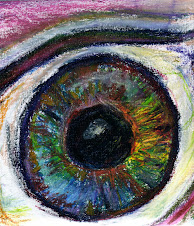Saturday, June 26, 2010
Howard Engel, author with alexia
In other words, this professional writer suffered brain damage that destroyed the part of the brain that recognizes written language. The feature article in the January 28, 2010 issue of The New Yorker Magazine by Oliver Sacks explores the problem and the disciplined approach that Engel took to cope. He depended on the brain's plasticity to relearn reading by another modality. He traced the letters with his fingers finding that that movement inputted the information into his mind so he could decode the words on the page. As his proficiency improved he switched from tracing letters with his fingers to using his tongue, a faster method. The saga is also described in a recent NPR interview: http://www.npr.org/templates/story/story.php?storyId=127745750. Like the process Oliver Sacks explains, vision therapy also depends on the brain's plasticity and on a whole body approach to developing visual skills. Everyone can learn to read better, faster, more efficiently, with better comprehension and without getting confused. It is the premise of my Eye Can Too! Read series of e-books.
Tuesday, June 22, 2010
Look with your eyes, not with your hands.
When my children were little and we went into a shop or a home belonging to someone with many visually attractive items within reach I had a saying that I repeated ad infinitem: "Look with your EYES, not with your hands." It was a familiar reminder of the etiquette required in such places. For some children, however, this instruction would be tantamount to blindfolding them because they do not value their eyes as efficient gatherers of information. Some children have poorly developed visual attention, responding more to auditory or tactile clues. These are the people who can never "find" anything that they are looking for even when it is right in front of them - not because of being distracted - they really don't see what they are trying to find. Other children have not developed adequate control of their eye movements and may even be mis-labeled with an attention hyperactivity disorder. These children cannot hold a visual fixation for long enough for the image to register - they may have deficits of pursuits (the ability to track a moving object) or of saccadic eye movements (the ability to make short accurate visual shifts in focus such as a reader makes when transitioning from one word, line, or paragraph to the next). If yourchild does not seem to LOOK where he or she is going, do not make the excuse that they are an auditory or kinesthetic learner (of course they may prefer to obtain new information through these channels but that does not mean they should not be assisted to develop the visual skills that will allow them more efficiency.) If it seems that your child does not gain new information by means of their eyes, schedule a comprehensive eye exam with a doctor who evaluates children's developmental visual skills. Then begin to incorporate visual challenges into every day situations - for example, draw a picture or write instructions for a task that the child must do with a reward for accomplishing it. And, consider purchasing a good resource like one of the Eye Can Too! Read e-books. Everyone can learn to use their eyes more efficiently no matter how they learn best.
Friday, June 11, 2010
Playing Croquet takes a combination of highly developed visual skills
All you have to do is aim a wooden ball with a clumsy wooden mallet to roll through a wicket the size of a clothes hanger. Of course if you bump into a competitor's ball you can advance a bit faster and if you get bumped you may be driven far off course. Suppose you lack the ability to discriminate between left and right on yourself or to project the knowledge of left and right into space? You'll have trouble sending the ball in the correct direction. Suppose you lack the visual perceptual skill of visual memory so that you can't create a mental image of how the ball will respond when you tap it from a certain side? You'll have trouble planning the next moves. Suppose you have delays in the development of visual-motor integration? You'll miss the ball or, if you are bumping another person's ball out of the path you might hit your foot instead. Suppose you have trouble transitioning from a central to a peripheral focus? It will be very difficult for you to judge how to strike the ball in relationship to the wicket yards away. It is needless to conclude that playing the game of croquet requires a combination of highly developed visual skills. So, if you have been playing that game with your children and one of them consistently quits in frustration, you might consider asking a developmental optometrist to do a comprehensive examination of their visual skills. Like optometrists are fond of saying, vision is much more than 20-20 eyesight.
Subscribe to:
Comments (Atom)




